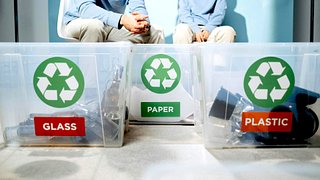

This ESL negotiation lesson plan guides learners through essential negotiation skills in a business context. Students will engage in role-playing activities to practice structuring arguments and using key phrases for effective communication. With exercises focused on business vocabulary, sequencing arguments, and persuasive techniques, this lesson helps students gain confidence in negotiation scenarios.
Skills

This ESL lesson plan introduces students to the essential steps and practices of recycling in a 45-minute group lesson focused on writing. Geared toward B2-C1 learners, the lesson explores how to sort and process materials like paper, plastic, metal, and glass. Through vocabulary exercises, structured discussions, and a writing task, students gain an understanding of the recycling process, practice describing complex procedures, and learn sustainable habits to support environmental responsibility.

This ESL lesson plan helps teens practice speaking skills in a 45-minute group session by discussing and comparing ideas for a special birthday celebration. Through engaging scenarios and debate activities, students at A2 level will explore how to compare and contrast options to make thoughtful decisions using the comparative degree. The lesson includes group discussions, grammar rules for comparing ideas, and a fun debate to encourage students to collaborate and communicate effectively.

This ESL lesson plan introduces proficiency level learners to engaging speaking exercises focused on speed chatting and talking about yourself. Structured for advanced and proficient English learners, the lesson includes quick conversation rounds on language goals, reflections on identity, and a group exercise where students describe themselves with action-oriented statements. This 60-minute session strengthens students’ conversational fluency and introspective skills, creating a dynamic, interactive classroom experience.

This ESL lesson plan introduces key vocabulary for travel and accommodations while developing reading and speaking skills. Students explore practical tasks like understanding emails, identifying details, and matching events to dates. Engaging discussions, gap-filling exercises, and cultural insights about Madeira make this a fun, interactive lesson for learners at A1/A2 levels.

This ESL lesson plan guides B1 level students through essential steps of the immigration process, focusing on reading and writing skills in an individual setting. Students will test their knowledge, engage in vocabulary matching, and read a detailed text about immigration procedures. With a mix of comprehension and practical application tasks, students build confidence in understanding and discussing the complexities of immigration.

This engaging lesson plan designed for adults and teens (B1/B2 level) targets speaking skills and second conditional grammar through discussions, character matching, opinion analysis, and creative role-play scenarios. Students practice describing hypothetical situations, unscramble sentences to reinforce grammar rules, and debate which Friends character they relate to most. Perfect for fans of the show, this lesson plan combines pop culture fun with practical language development, encouraging fluency and confidence in imaginative communication.

Discover our engaging ESL lesson plan based on topic "Money" designed for adults at the B1 level. This 60-minute group lesson focuses on developing reading and speaking skills through a variety of exercises. Students will read an article about money and discuss different life stages and financial habits. The lesson includes vocabulary matching, comprehension questions, and opinion-sharing activities. Perfect for enhancing language skills while exploring the topic of money.

This ESL lesson plan is designed to help B1-B2 adult learners develop self-presentation skills for job interviews through structured speaking and vocabulary exercises. Students will engage in activities such as mock interviews, vocabulary matching, and self-introduction practice to build confidence in describing their qualifications, career goals, and professional experience. By role-playing as both interviewers and interviewees, students will gain practical skills to effectively express their strengths and prepare for real-world interviews.